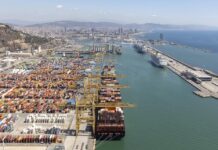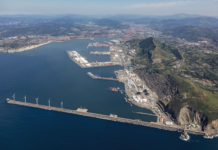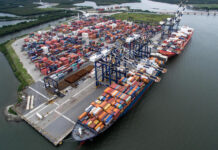The Maritime and Port Authority of Singapore (MPA) continues to prepare the Port of Singapore and Singapore-registered ships for the International Maritime Organization’s (IMO) 0.5 per cent fuel global limit for sulphur in fuel oil used on board ships, which will take effect from 1 January 2020. In his opening address at the Singapore Registry of Ships (SRS) Forum today, Chief Executive of MPA, Mr Andrew Tan, also announced initiatives by MPA to improve the delivery of its services.
Engaging Industry through the SRS Forum
Themed “Riding the Next Wave”, this year’s SRS Forum focused on how companies can prepare for the upcoming environmental challenges. Distinguished speakers from organisations such as Wavelink Maritime Institute and China Classification Society overseas technology centre also spoke on the changing needs of seafarers and autonomous ship technologies. About 400 participants from the industry and institutes of higher learning attended the forum.
Mr Andrew Tan said, “The SRS Forum is an important platform for us to engage the industry on new developments, such as the growing use of technology to enhance business processes and tightened environmental regulations. We will continue to engage the industry to address any concerns they may have.”
The forum also saw two companies being honoured for their contributions that led to the SRS tonnage crossing the 91 million gross tonnage (GT) milestone. Another 17 companies were recognised for their efforts in developing a Singaporean core in maritime manpower.
Preparing for IMO 2020 Global Sulphur Limit in Fuel Oil Regulation
To prepare for the IMO 2020 0.5 per cent global emission limit for sulphur, MPA and the Singapore Shipping Association released two technical guidance booklets for Singapore-registered ships and ships calling at the Port of Singapore. The booklets outline the options available for ship operators to comply with the new regulations which include the use of approved abatement technology such as scrubbers, alternative fuels and compliant fuel oil. Both booklets will be made available on the MPA website.
Service Enhancements for Singapore-Registered Ships
Assessing the quality of SRS fleet through a five-year programme
The SRS is internationally recognised as a quality flag with high standards of safety of operations and marine pollution prevention. This is achieved through regular engagement with the industry and stringent Flag State Control (FSC). To ensure Singapore-registered ships continue to operate at a high standard of safety worldwide, MPA has started conducting overseas inspections on selected SRS ships, as part of a five-year SRS Quality Flag Assessment Programme.
Expanding the suite of e-services for the SRS
To enhance services available to Singapore-registered ships, MPA rolled out two new online services on Marinet. The Singapore Seaman Discharge Book1and the Maritime Labour Convention financial security certificates can now be applied through Marinet. In addition, Receipts of Acknowledgement will now be automatically issued upon the application of MPA’s Certificate of Endorsement (COE), which will minimise delays in crew signing for Singapore-registered ships. To complement MPA, selected recognised organisations (RO)2 have started issuing statutory electronic certificates on MPA’s behalf.
To harness new technologies for increased productivity, MPA has also started trials involving the use of blockchain for ship registration and use of robotic process automation for the issuance of crew and ship certificates.
Use of Remote Inspection Techniques for surveys of Singapore-registered ships
Since October 2018, MPA has accepted the use of remote inspection techniques for surveys of Singapore-registered ships. These techniques include the usage of unmanned robotic arm, remote operated vehicles and unmanned aircraft systems (commonly known as “Drones”).





